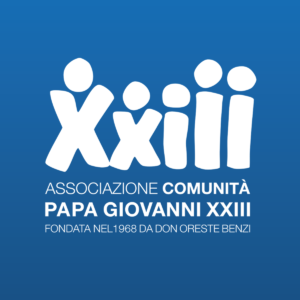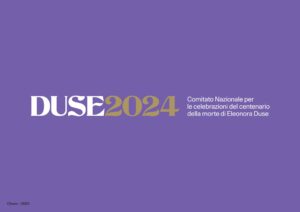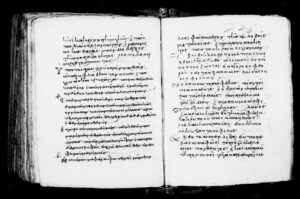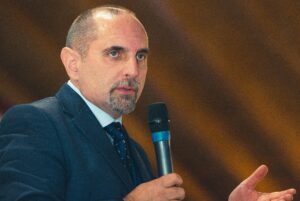Bari: Meeting of Jews-Messianics
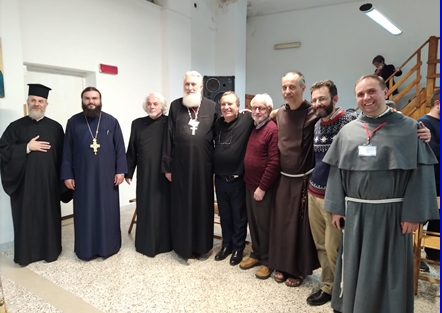
The year 1968, marked by the rebellious spirit of youth protest, was also the year of the birth of the Catholic Charismatic Renewal and of the Jewish-Messianic Movement, in which the spirit of God breathed, aimed at re-establishing the lordship of Jesus over the nations and over the Jews.
While the Catholic Renewal is well known by the Church, the Messianic Jewish Movement is not so, which over time has given rise to various communities of Messianic Jews active throughout the Jewish world, in Israel and abroad professing the neo-testamentary faith in Jesus Messiah and Son of God, combined with the more or less complete practice of the ancient Jewish observances.
In recent days, the Community of Jesus in Bari hosted the VII meeting on the dialogue between Catholics and Messianic Jews which saw the participation of Catholic, Evangelical, Orthodox and Messianic Jewish scholars, entitled “Towards the full restoration of the Una Ecclesia of Yeshuah HaMaschiach” (Romans chap.11).
“Introduce the mystery of the bride of Christ, the Church, in recent times and the reconciliation between Jews and Gentiles in Jesus Messiah of Israel, launching a strong message of hope and faith supported by a certainty: “The bride goes to meet Jesus who returns (revelation 22,20), the objectives to be achieved.
To open the works Matteo Calisi, founder and president of the Community of Jesus of Bari, member of the National Service Committee RnS, President of the Catholic Fraternity and vice-president of the ICCRS, as well as international leader of the CCR and particularly involved in the ministry of ecumenism among the various expressions of Christian believers who live the experience of Baptism in the Spirit, to whom we asked “What is the relationship between the Charismatic Renewal and the Jewish-Messianic movement, given that the Messianic Jews are distinguished by their observance of the Jewish calendar, of the and Jewish holidays, instead of taking Sunday and the Christian calendar to regulate the rhythm of their life? Furthermore, some communities are of purely Jewish worship, while others conform to the Christian style; generally they baptize their members, other communities practice only the baptism of adults and celebrate the Lord’s Supper”:
“I believe there is only a certain friendship t among some groups of the Charismatic Renewal and the Messianic Jews” his response. Regarding the Eucharistic celebration at the conclusion of the conference, he underlined that “As the Catholic Church we do not practice inter-communion or Eucharistic hospitality”.
The meeting was attended by: H.E. Msgr. Mario Paciello Bishop emeritus of Altamura-Gravina-Acquaviva delle Fonti, spiritual adviser of the Community of Jesus, giving a brief greeting to the guests; Benjamin ShelHaseh, Berger of the Jewish-Messianic Community Congregation of the Lamb on Mount Zion in Jerusalem (Israel), who focused on the restoration of the Ecclesia in view of the wedding of the Lamb and the second coming of Yeshuah HaMashiach; Father Mariusz Orczykowski ofm. conv. (Poland) who dealt with the theme of reconciliation between Israel and the Nations in the light of chapter 11 of the Letter to the Romans of St. Paul the Apostle; Pastor Eli Dorfman (Israel) who presented the challenges for the unity of the Ecclesia in its spiritual journey; Prof. Vasile Mihoc, priest of the Orthodox Church of Romania, who described the Church as the Unique New Man in Christ the Messiah (Eph 2.15) in the light of the New Testament and early Christian literature; Father Mario Imperatori, Dean of the S. Luigi Section of the PFTIM in Naples, where he teaches sacramental and dogmatic theology, dealing in particular with the theology of marriage and interreligious dialogue; fra Pier Giorgio Taneburgo of the Capuchin Friars Minor of Bari, professor of Ecumenical Theology at the Pugliese Theological Faculty, author of essays on the relationship between Orthodox Christians and Jews (L’ecumenismo delle Radici, 2017) and on the theology of religious experience in the Mediterranean context and on the Ecumenical Council.
According to Benjamin ShelHaseh Berger who since 2002 is one of the main speakers at the meetings of the dialogue meetings between Catholics and messianic Jews sponsored by the community of Jesus in Bari: “However, it is very sad that 99% of Catholics know absolutely nothing about the growing messianic movement in Israel and in the world. Most likely this is because of the Catholic churches teaching that the Catholic Church is the true church and the only church and the oldest of all churches that was founded by Jesus Christ; this however is not the whole truth, since the earliest expression of the church was the Jerusalem church that was born on the day of Pentecost when the Holy Spirit was poured out. This Jerusalem church was entirely a Jewish church until later on, when Gentiles were added to it.
These Jewish Believer‘s continued being Jews until the end of their lives, they never converted to another religion because they believed that Jesus was a descendent of king David who was the king of the nation of Israel and was a Jew.
Yeshuah, thhe original and Hebrew name for Jesus, was born as a Jew and as the king of the Jews. He was circumcised on the eighth day as all Jewish males are circumcised. He died on the cross as king of the Jews and when he was resurrected his resurrected body continued to be a Jewish body.
Saint Paul, who was sent by God to be the apostle to the gentiles, continued for his whole life to be a Jew and was finally martyred as the Jewish apostle to the gentiles.The Virgin Mary the mother of our Lord was a daughter of Israel and continued to be a daughter of Israel until the end of her life.
At the last supper, the great Passover meal, Yeshuah made the new covenant with his Jewish disciples when he took the unleavened bread and broke it and proclaimed: “This is my body which is broken for you”, and then he took the cup and said “This is the cup of the New Covenant in my blood shed for you”, he was and he is the paschal lamb who takes away the sins of the world.
We Messianic Jews are like the Jews Who belong to the mother church of Jerusalem at the very beginning of church history.
We were born as Jews and we continue to live as Jews as did the first in the very beginning of church history, we have fully entered into the New Covenant that Yeshuah made with the house of Judah and the house of Israel, believing as did the first Jewish Nearly 2000 years ago.
All of this is truly a great challenge for Catholic understanding and theology. We love and appreciate our Catholic brothers and saints within the Catholic Church who now call us the “ The Older Brother” and we forgive the Catholic Church for persecuting the Jews in the long history of the church, though there has been very little repentance for her sins Toward the Jewish people.We believe that it is time for all Catholics to wake up to this great reality as God resurrects the messianic community. We deeply appreciate Matteo Calisi for being a true friend of the messianic Jews. May God grant that within the Catholic Church there will be many more true friends from among our brothers and sisters in the Roman catholic church”.
Responding to my personal question on how much belonging to the Jewish race affects salvation, he specified: “We recognize the full equality in Christ that exists between all believers wether Jew or gentile in terms of our salvation as Jesus died for the Jew first and for the gentile. Both belong to a humanity that has fallen and is sinful, and in need of redemption. In that sense as the apostle Paul wrote” there is neither Jew nor gentile. There is however a difference in the calling of the Jews from the calling of the Gentiles.
The apostle Saint Paul wrote in chapter 11 to the Romans that” The gifts and the callings of God are irreversible, God never takes them back and never takes them away. This he said with regards to the people of Israel. The Gentile nations have also received special gifts from God, but they are not the same as the gifts that God has given to Israel.
Messianic Israel according to Romans chapter 11 is represented as the cultivated olive tree, the root of that tree is the Messiah himself. The Gentile nations who have been redeemed are represented as being branches of a wild Olive tree that has been grafted into The cultivated Olive tree. To be a Messianic Jew is to be a broken branch of the cultivated olive tree that has been re-grafted into its own tree. According to the epistole to the Ephesians in chapter 2, you who are of the Gentiles have become a part of the “Commonwealth of Israel” You have been United with us, who represent the redemption of Israel through the salvation of our Messiah Yeshuah HaMashiach,
With much blessing Benjamin ShelHaseh Berger”
We also wanted to ask some questions to Fra Piergiorgio Taneburgo who celebrated Holy Mass at the end of the assembly.
You have a great interest in the dialogue between believers of various religious traditions. Would you like to explain to us who the Messianic Jews are and how the Messianic Jewish Movement was born?
They are Jews who have preserved their cult, their origins, traditions and liturgy and who recognize in Jesus of Nazareth the role and mission of the Messiah. The Movement dates back to the mid-19th century.
Do they believe that the only God is Father, Son and Holy Spirit? Do they use the term “Trinity”? How do they stand before the Catholic Creed?
In regards to Orthodox Jews there is the desire and ability to read, interpret and live the inspired Word in the New Testament. For us Catholics there is the prophecy of Habakkuk “The just shall live by faith” (second oracle) taken up in chapter 1.17 of the Letter to the Romans.
What religious practices do they follow and why, considering that these practices were rejected by Jesus on the cross? Do they believe they are saved by the works of the law? (see Ephesians 2,8-9; Acts of the Apostles 15,1; Romans 8.14; Galatians 4,6; Philippians 3,3-8). In this regard, in the letter to Galatians 2:16-21 it is written: “Knowing however that a man is not justified by works of the law but only by faith in Jesus Christ, we also believed in Christ Jesus in order to be justified by faith in Christ and not by works of the law, for by works of the law no one shall ever be justified. I no longer live, but Christ lives in me. And this life, which I live in the body, I live by faith in the Son of God, who loved me and gave himself up for me. Therefore I do not make God’s grace in vain; for if justification comes from the law, Christ died in vain.” Just as we also read in Titus 3:4-7: But when the goodness of God, our Savior, and his love for men appeared, he saved us, not by righteous works done by us, but by his mercy, with water that regenerates and renews in the Holy Spirit, whom God has poured out upon us in abundance through Jesus Christ, our Savior, so that, justified by his grace, we may become heirs of eternal life in hope”.
It is important to understand the doctrine of justification well, however on this there is an agreement that has been reached with the brothers of the Reformation, with the Protestants. Even the Messianic Jews are part of this controversy and it is a theme that is continuously explored and studied.
Are Messianic Jews in constant motion, continuously looking for how to live closely united with each other as Jewish disciples of Jesus, without setting any historical model to follow?
Messianic Jews remind us of the essence and truth of the first great schism also called “protoschism”, that is, they remind us that Jesus is a Jew, that he Is so forever, and that so are the Virgin Mary, Joseph of Nazareth and the first disciples. Even after Jesus’ last Passover, in the Acts of the Apostles it is said that the Jews, Peter in particular and the other disciples continued to go to the temple in Jerusalem to pray just as practicing Jews would have done. In this regard, I quote a sentence from a famous Swiss Protestant theologian who lived between the 19th and 20th centuries, Karl Barth: “There is only one truly great ecumenical question, our relationship with Judaism”.
How many and in which countries is there a greater concentration of Messianic Jews?
They are growing numerically compared to the Orthodox Jews, above all in Israel, in the United States of America and also in Europe, where in the past there were significant presences such as those of the Hasidim (wise Jews who lived in Poland, Ukraine), communities exterminated during the years of the Shoah. Right here the Messianic Jews have returned founding Congregations equivalent to our parishes.
The numerous Jewish communities live their own Jewish identity, formulate their faith in Yeshuah HaMashiah, live and celebrate their worship in a different way: some are similar to various currents of Protestant and Evangelical Christianity, others closer to traditional Jewish worship and others still refer to orthodox rabbinism. Are there divisions here too? Is there not a central authority to ensure uniformity of language, definitions and practice?
No. In Judaism as in all other religions we have many divisions. There are Ultra-Orthodox Jews who are characterized by their clothing and hairstyles, Oro-Orthodox Jews, more moderate Orthodox Jews, Reformed Jews who allow women to become “rabbis”, a practice that does not exist in traditional Judaism. Messianic Jews, in order not to create conflicts with traditional Jews, do not train any rabbis in their schools.
Does the Jewish Movement define it as a type of Judaism that confirms their relationship with the religious faith and lifestyle of the Jewish people who have lived throughout its history?
Yes. It reevaluates and highlights the biblical category of “Kingdom” a lot, when we speak of the Kingdom of Israel or when we think historically of the time in which Israel was governed by a King and in particular by King David. We Catholics await the second coming of the Lord, while Messianic Jews await the first coming of the Messiah. It would be important for us too to go back to discovering the value and essence of the Kingship of the Messiah as the Messianic Jews urge us to do.
Does Messianic Judaism represent the resurrection of a very ancient Movement?
Judaism is a pre-existing religion to Christianity. John Paul II, while visiting the synagogue of Rome in 1986, called the Jews “our elder brothers” and therefore it will be essential to try to tune into their wavelengths, freeing us from prejudices, such as that of believing that all the Pharisees at the time of Jesus were gray Jews, a negative color.
Do they believe that the restoration of Jewish community life in the body of Christ will occur simultaneously with the “return” to the land of Israel? The two things herald the end of time, so can the Messianic Movement be considered an “eschatological sign”?
Certainly. They encourage us and make us pay attention to the parousia, the definitive return of Jesus in glory (see chap. 25 St. Matthew and Revelation 19,7-9, Jesus meets his bride, The Church), after being welcomed for the first time in his weakness, in his annihilation. Messianic Jews, on the other hand, await the Messiah, a King who will restore everything, who will inaugurate a kingdom of justice according to the prophecies of Isaiah, when all wars will be over and there will be peace everywhere on Earth.
Is it true that many Messianic Jews have inherited a certain hostility towards the Catholic Church, which is based on Jewish historical memory and is reinforced by the suspicion nourished by evangelical Protestants towards Catholics?
No. If this were the case, they would not have participated in the series of meetings that have been held for years in an experimental way, always in this location. Several articles have been published in this regard in Catholic Theology magazines also by a well-known Jewish-messianic theologian Mark Kinser in 2010. The perpetrators of the Shoah who persecuted the Jews were faithful baptized either in the Catholic Church or in the Protestant Church, and yet still they had no qualms about having millions of Jews deported and killed.
What has changed since the first international meeting in 2002 which also took place here?
I think there is greater awareness, because texts have been published that also suggest new possibilities for dialogue. In fact, there is talk of a bilateral ecclesiology, consisting in the fact that the discourse on the Church should not start only from Catholic presuppositions, but should also be critically founded on presuppositions proper to the Jewish religion. Perhaps one day we will arrive at a catechumenate to welcome, into the Catholic Church, infidel Messianic Jews who want to keep belonging to Judaism, as it has already happened with some Anglicans who have converted to the Catholic faith while preserving the heritage of the Anglican tradition.
Would the Messianic Jews in this catechumenate be baptized?
I don’t know. We need to see what kind of steps liturgical and theological praxis will be able to take.
In 2008, with the Vatican II document Lumen gentium, an agreement was found on the fact that the original constitution of the Church is based on the unity between the ecclesia ex Iudaeis (the Church originating from circumcision) and the ecclesia ex Gentibus (the Church originating from nations). Thus, the basis was formed for further discussions relating to the theological-doctrinal issues that you face. What steps have been taken in recent years on the most controversial topics such as Baptism, the Eucharist, priesthood, apostolic succession?
This question reminds me of the primitive division. When entering the Basilica of S. Sabina on the Aventine hill in Rome, we observe on the counter-façade a mosaic depicting the two souls of the Church: the Ecclesia ex circumcision, the Mother Church deriving from Judaism and the Ecclesia ex Gentibus, the Church of the Gentiles carried on by St. Paul the Apostle. About 10 years ago the Catholic Church thought of starting a semi-official dialogue between the two churches, as there are bodies and people in charge of doing this in the Dicastery for the Promotion of Christian Unity, which Messianic Jews have always referenced and this represents an important sign.
What can you say about the unity of the body of Christ (the tearing down of the “dividing wall” between Jews and Gentiles in Christ, Eph 2:14) and the theological significance of the Jewish attachment to being a people and to the land?
When speaking of Israel we use the expression “Holy Land”, but tells nothing to the Jews. Neither should Palestine be mentioned when speaking to them, because they are fighting to repossess their land, therefore to meet their demands we should speak of the “Promised Land”, reserved by God for them to live on.
A dialogue that leads to peace is the one indicated by the Truth which is Jesus Christ. He is the way, the truth, the life. Thomas said to him: «Lord, we do not know where you are going; how can we know the way?” Jesus said to him: «I am the way, the truth and the life. No one comes to the Father except through me. If you have known me, you will also know my Father: from now on you know him and have seen him.” Philip said to him, “Lord, show us the Father and it will be enough for us.” Jesus answered him, “I have been with you for a long time and you have not known me, Philip? Whoever has seen me has seen the Father. How can you say: «Show us the Father»? Don’t you believe that I am in the Father and the Father is in me? (John 14, 5 – 11)
These words reveal to us the true essence of Jesus, but they are already the fruit of a theological elaboration, because Jesus never expressly wanted to declare that he was a son of God; instead he revealed his identity as a son of man, speaking of his mission among the people of Israel, of which he has become increasingly more aware. One thing is the mission of Jesus as he lives it on the day of his baptism in the Jordan River, another thing is his mission as he embodies it, lives it and interprets it on the wood of the cross at the end of his human adventure. divine. Meeting the Messianic Jews we return to the words of the old Simeon, who prophesies in the temple of Jerusalem welcoming the baby Jesus in his arms: “This is the light that will illuminate all peoples, the glory of the people of Israel itself”. It is as if the Jews were grateful to us, because the spread of the Catholic faith has allowed Judaism to reach the ends of the earth bearing fruit.
Have you taken any further steps forward in recent days to achieve the desired end?
It was nice to meet and even more nice to see the participation of the Orthodox brothers, and some brothers of the Reform. It’s like we Catholics were first enlightened by a bigger sun born in the East, which is Jesus of Nazareth himself. Also in the message that Pope Francis wrote for the World Poverty Day in recent days, reference was made to the city of Jerusalem, the worker of Nazareth and the shepherds of Bethlehem. It was a message imbued with theology and life, which come from Judaism.
Did you participate in the Eucharistic celebration at the end of the convention as a sign of unity of God’s people?
During the celebration of the Eucharist, the Messianic Jews lived our liturgy in their places; we prayed together with them, for them. In the end we re-proposed Aaron’s blessing present in the book of Numbers (6,22-27) and inserted in the Roman Missal, a blessing proper to the Jewish people and which we Catholics have made our own; St. Francis of Assisi wrote the same blessing on the parchment for Brother Leo. The Orthodox and Reform brethren did not receive communion either. We await the possibility of passing from a spiritual ecumenism which consists in dialogue and praying together to a visible ecumenism, one of the concrete manifestations of which is Eucharistic hospitality, or intercommunion, a goal not yet achieved.
Cinzia Notaro


